The first time I saw Shay Mehrdad play guitar was during a Bent Tool show at The Huntridge in the early 90s. They opened with Van Halen’s “Eruption,” and much to my amazement, Shay nailed it note for note. The Mystic Records style punk that followed was great too, and I later stumbled across a soundboard tape from that show that I played until it wore out.
Shay would later go on to play in a long line of influential local bands including Tomorrows Gone, Lickitysplit, Attaboy Skip, Faded Grey, and Curl Up and Die. I may be a bit biased as I was also a member of two of the aforementioned bands, but I think he will go down as one of the most talented guitarists in Las Vegas punk and hardcore history. Based on first hand experience, Shay can play just about anything; I know because I have hummed half-assed song ideas to him that he quickly turned into hardcore tunes that truly moved me.
The topper to his guitar shredding talents is that he is also a certified solid dude. Shay is always humble about his musical prowess, and while it sounds cliche, I’m sure he would give you the shirt off his back if necessary. His family and friends are very lucky to have him in their lives.
What follows is part 1 of a two part interview I conducted with Shay in early 2013. His story has gone largely untold up until now, so sit back and enjoy a look into his formative years and first bands.
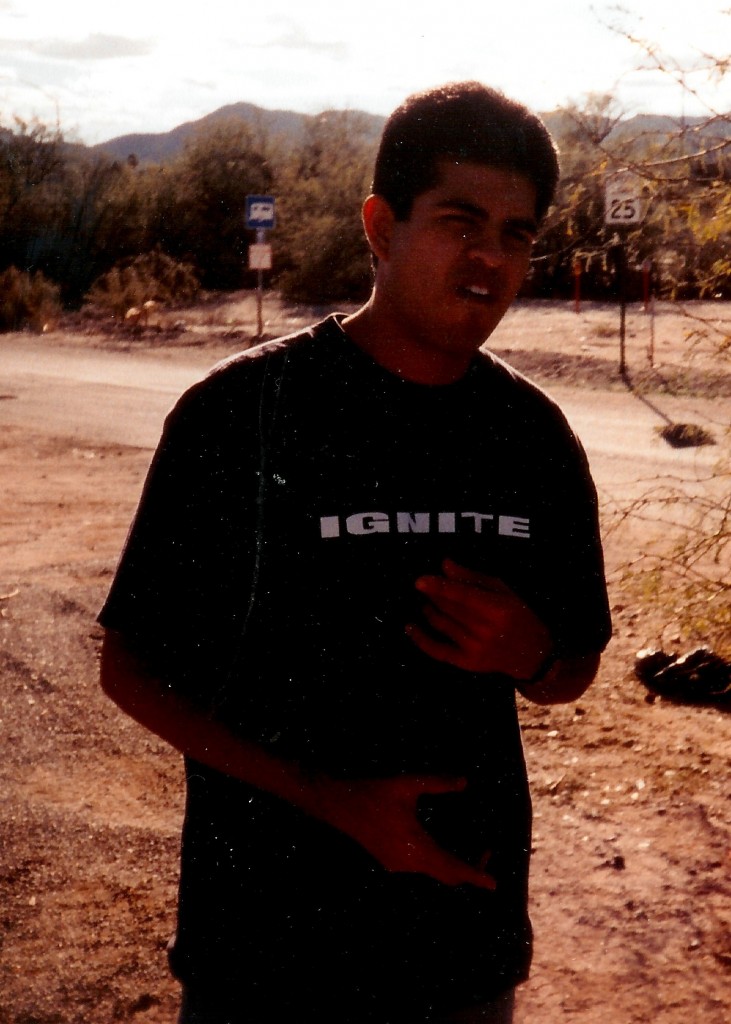
Parts unknown, AZ on the Tomorrows GoneBoba Fett Youth mini-tour 1996
Let’s start with how you became interested in playing guitar. What were the first bands you heard that made you want to pick up a guitar? What was the first guitar and amp you owned? Did you take lessons or did you just have a natural knack for playing?
I actually didn’t choose to play guitar at first. When I was 8 years old (’84 or maybe ’85), my parents thought it would be a good idea if I took up an instrument. I think they saw me rocking out with my air guitar to The Scorpions or Van Halen on MTV. I remember them asking me if I wanted to play guitar. Soon after, they came home with a Squier Bullet Strat hybrid guitar (mini Strat body, Tele neck, dual humbuckers) and a Peavey Audition practice amp. They bought the setup at the old Al DePaulis Music Store on Maryland and Tropicana and soon after, I had regular Saturday lessons there. The lessons helped early on and it seemed like I had a good ear for it, but after a while in those early years, I kinda saw the lessons as a chore. I didn’t think my parents would let me quit so I just kept on with it.
Things changed when I was around 11 years old. I started studying with a new teacher named Dick Eliot who was a much more serious teacher and I credit him with dismantling everything I knew up to that point and building it all back up from scratch. My technique improved a lot and I got a better understanding of what could be done with the instrument. I was also getting exposed to different styles of playing and disciplines like classical, flamenco, finger-style jazz, gypsy, bebop, etc.
Around that same time, I was able to apply the improved playing, mix that with what I could pick up by ear then listen to stuff and turn around and play it. Playing guitar became much less of a chore and more of a fun escape.
How about your initial experiences jamming with other people? What was the first official band you played in? What were some of the first live shows you played?
To be truthful, the first time I jammed with people was in junior high jazz band (Cashman). Nerdy, yes, but I met people in jazz band who’d later get me playing in punk bands and other kinds of bands in high school and beyond. In 8th grade, a guy named Justin Taylor joined the jazz band on drums. He was into punk rock and skateboarding so we became fast friends. We’d come to school early to jam Guns ‘N Roses and Bad Brains in the band room before class some mornings. He later moved out of state but came back around 10th grade and we picked up where we left off. That year, Justin convinced the Clark High baseball coach to allow him and I to set up our stuff behind the outfield fence at home games and play AC/DC covers and other hard rock covers between innings. The coach apparently was a big AC/DC fan. We called ourselves The 360’s because we set up behind that outfield marker. More on Justin later.
Probably important to note is that I met Ronnie Vannucci [The Killers] in our 10th grade year at Clark before he left to finish high school at Western. I found out he played drums, he found out I played guitar, so we started hanging out and jamming. Soon after, we’d play backyard parties and generator keggers in the desert, just him and I with no bass player, and we’d play bad covers of Jane’s Addiction, Nirvana, U2, Smashing Pumpkins, whatever else was popular at that time. Incidentally, one of those parties was attended by one Mike Rosati who later admitted to me that he was angling to steal my guitar. Ronnie and I would later play in more fully realized bands but jamming with him and forcing ourselves out into the world to play was also pretty valuable in the grand scheme.
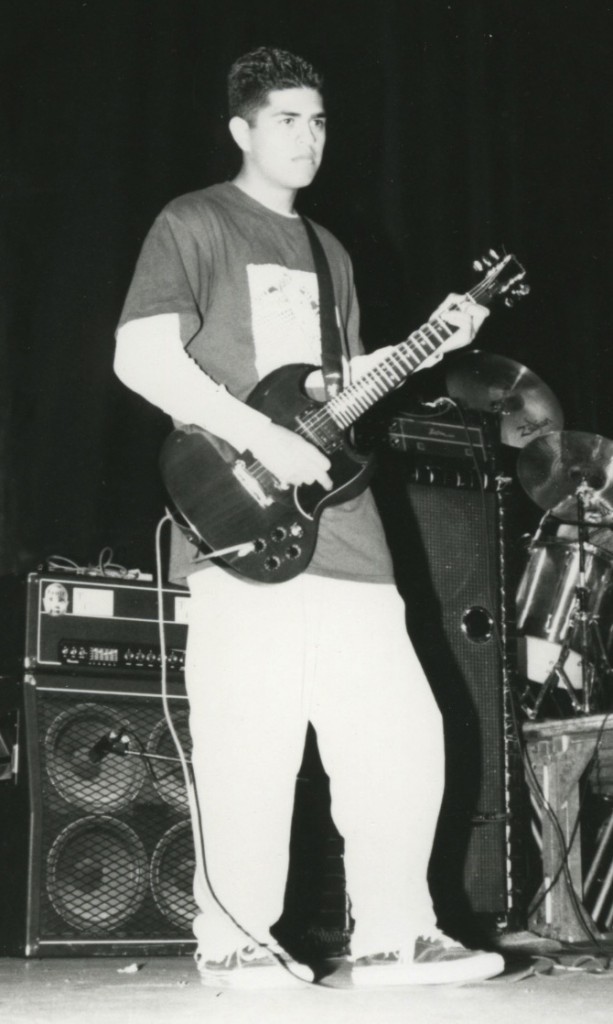
One of Shay’s first shows with TG at The Huntridge circa 1994
What about your introduction to punk and hardcore? What were the first punk/HC bands that interested you? I’m guessing Bent Tool was the first punk band you played in. Tell me a little about that experience and how you hooked up with those guys.
The first punk bands I was introduced to came from skateboarding. I was never great at skating, but I immersed myself in that world. I read all the skate magazines and watched all the skate videos I could.
In the heyday around ’88, I remember renting those old Vision competition videos and learning the Agent Orange surf covers that played during the end credits. I also remember being exposed to Black Flag, The Minutemen, Firehose, Descendents, MDC, Bl’ast, Verbal Abuse, Gone, etc. thanks to the Sick Boys video and the Wheels Of Fire/Streets On Fire Santa Cruz videos. I also have vivid memories of The Faction, JFA, McRad and other skate-rock bands from that time.
Later, through Justin Taylor and probably thanks to his older brothers’ music collections, I got introduced to Bad Religion, Bad Brains, Minor Threat, Reagan Youth, The Adolescents, all that Mystic-era NOFX and RKL, Doggy Style, Sub Society, Marginal Man, D.I., SNFU and so on. He’d make me tapes of random blocks of songs from a bunch of different bands and I’d just eat it up and listen to those tapes ’til they were unplayable.
Bent Tool was the first real punk band I played in. Horrible name but so be it. When Justin moved back to Vegas around ’91, he’d started playing drums in Bent Tool. He eventually brought me along for the ride. I took the spot in the band vacated by a guy named Kevin Kettel, who had played guitar in Poor White Trash, Schizoid and, for a very short time, NOFX. My standing order was to solo over everything, so that’s what I did.
My first show with Bent Tool was at the Huntridge opening for NOFX, No Use For A Name and Jugghead’s Revenge in late ’92. I was 16 and this was also my first real punk show. I remember being nervous since I hadn’t played anywhere that big or for as unruly a crowd before. That same night before the show, I was pulled over, held at gunpoint and cuffed by police across the street from the Huntridge because I (and my shitty car) supposedly matched the description of someone they were looking for. They eventually let me go which actually eased my nerves to play. I remember being somewhat in awe at the time because I’d started listening to NOFX not too long before that and there we were opening for them.
After that, I jumped headfirst into all the Epitaph and Fat punk I could find.
While you were playing in Bent Tool, you also joined Tomorrows Gone. What do you remember about the early days of TG? Was it difficult playing in both bands and why did you quit Bent Tool? Were your musical influences changing at that point?
I remember meeting Jeff Dean sometime in early to mid ’94, and he’d talked me into hanging out and playing guitars. He’d also gone to Clark and was a couple years ahead of me but by the time we became friends, he’d long since graduated. I remember you eventually coming over to Jeff’s and we’d all sit around and jam and listen to music. Seemed like a no-brainer that I would eventually join Tomorrows Gone. By then in my senior year of high school (it’s easy to remember things parallel to where I was in school), I was into Quicksand and Fugazi among others, so naturally in wanting to find out more about the people in those bands, I was soon digging through the Revelation and Dischord Records catalogues. Thus came my exposure to the world of NYC and DC punk and hardcore.
I was starting to disassociate from the Fat/Epitaph punk of the time and wanting to get more into what I saw as punk with a social conscience. Tomorrows Gone seemed like a natural fit in terms of where my head was at, ideologically. I remember getting mix tapes and borrowing stuff from both you guys like Lifetime, Reason To Believe, 411, Endpoint, Guilt, Fuel, Silent Majority, Dag Nasty, Swiz and so on. Life at that point was full of inspiring new music (or new to me) both to check out and to play.
I don’t remember the overlap between Bent Tool and Tomorrows Gone being daunting. By that time, Bent Tool was in a odd place with members coming and going. By then, Rosati had been playing bass with us for a while. Justin Taylor was still involved but was going out of town frequently to handle some medical stuff he was facing. The singer, Paul Morris, was on his way out and would eventually move out of town, but near the end of his time in the band, he was just getting drunk and getting in fights at our shows. Things were up in the air and the future of the group seemed uncertain so I decided the end of high school would also be the end of my time in that band. I had fun, learned a lot and have good memories of the shows we played with Redemption/The Reform, Lady, Fried Green, a fledgling local HC band named Relent (ha!), a weird house show w/Lagwagon, opening for D.I. at The Huntridge, and the aforementioned NOFX show.
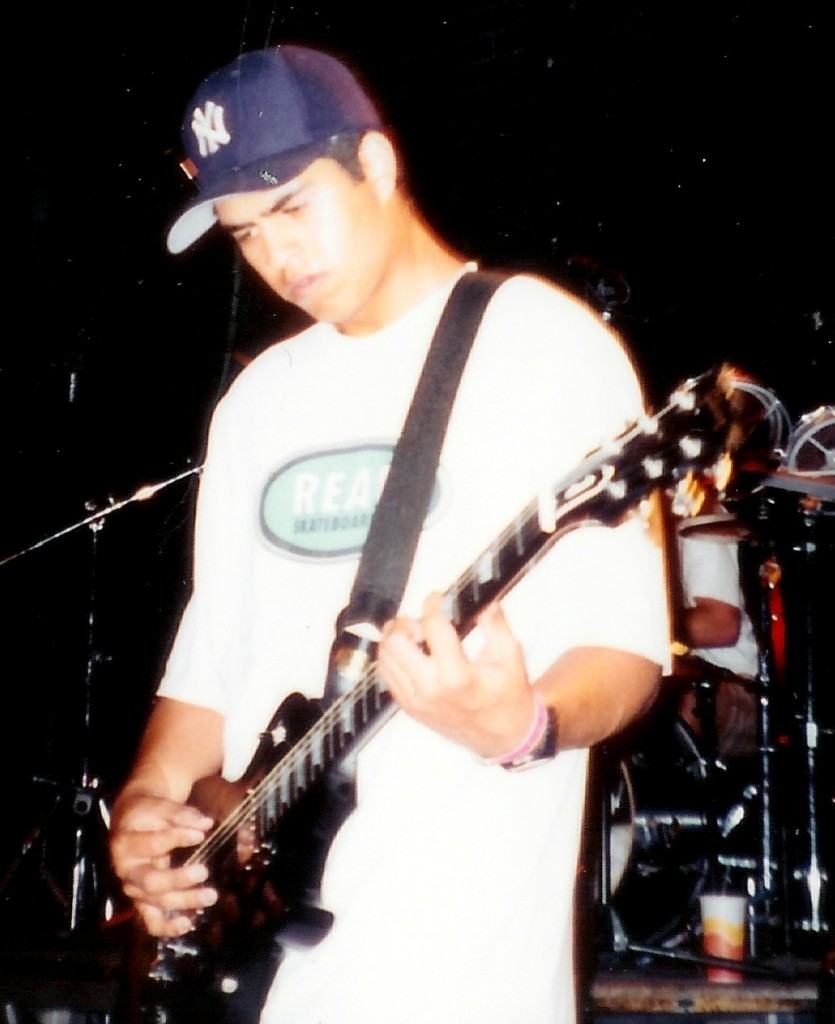
With TG live at The Huntridge in 1995
Eventually you also joined the band Lickity Split as a 2nd guitarist. I know you played live with them, and I recall you performing vocals on a cover of Jawbreaker’s “Boxcar” during a show as well. Did you ever record with Lickity Split and what was your general take on your time spent in that band?
I never recorded with Lickity Split. I liked the band and along the way Mike Pinaud and I became tight and would hang out quite a bit. I thought highly of his musical ability so I guess via mutual admiration, and since I got along with Matt and Judd, it led to me becoming a part of that band for a bit. My recollection is a little fuzzy but I remember him [Mike Pinaud] wanting to re-brand the band as Cap Gun Kids, and he was actively looking to find a drummer to replace himself so he could move out front and be more of a traditional singer. I remember meeting both a very young Jesse Fitz [Curl Up And Die] and a young Ryan Butler [Faded Grey] through these drummer tryouts. It’s unfortunate the band ended kind of prematurely. It would have been fun to get in on the writing end of it and see what all we could have done.
I did sing lead vocals on the “Boxcar” cover we did. That was my first and only time singing lead vocals live. I did backup vocals in Attaboy Skip at that same time so that probably led to mustering up the confidence to do that cover in Lickity Split.
I tried my hand at lead vocals later on for a band project I was working on while living in Phoenix. The group didn’t have a singer lined up so I attempted it out of necessity, but that didn’t go well at all.
In my opinion, fronting a band on vocals is the toughest job due to all the different levels of scrutiny you’re bound to face. I don’t want that job. I respect anyone who has the balls to try it and admire those that do it well.
I believe Attaboy Skip was next in your lineage of bands. I know that ska was huge in the mid ‘90s and that you had some real success recording and touring with the band. It also seems like you were really close friends with a few of the members of Attaboy Skip (e.g. Ronnie, Ted, etc). What are some of the better highlights and stories from those days?
The events leading up to the start of the band and my joining them are interesting, at least to me. Ronnie [Vannucci] and I hung out a lot in high school. I met Ted Sablay in a summer school history class but didn’t know he played guitar. He was the same age and grade but went to Cheyenne. During senior year, Ron and I went to a Cheyenne house party and there was Ted blazing on the guitar with a band he had with his friends. We thought we’d better buddy up with that guy. It wasn’t long before he was hanging out with us often. Ted even got me a hookup for my first job at the old Wherehouse Records & Tapes on Decatur and Meadows Lane.
There was a popular band back at Clark named Elephant Stone. They were a mix of funk, The Police, Stone Roses and early U2. Justin Vaden played guitar, Abe McCormick played keys and trumpet and Loren Jolley played bass. I had classes with Loren and played in the school jazz band with Vaden and Abe. They knew Ronnie and Ted, and there was a mutual respect amongst all of us regarding our collective musical abilities. We’d all hang out sometimes. Bronson Mack also went to Clark and was tight with the Elephant Stone guys and would hang out as well. We all were friendly with a guy named Branden Campbell, who went to Bonanza and played bass in a band called Summer’s Eve. Good ‘ole Vegas – where everyone knows everybody.
We began doing music stuff together later in my senior year when the Clark theater program put on a Spring play doing classic 70s Saturday Night Live bits. The guys playing The Blues Brothers, Rod Pardey and Mike Butta, wanted to do the bit with a real band. They knew all of us so they rounded up Vaden, Abe, Bronson (playing trombone), Ronnie, Loren and me to be the makeshift Blues Brothers Band. We learned to play the more popular songs and did the run of the play. Afterward, Rod & Mike hooked up a paying corporate gig, which Ted joined us for, where we as The Blues Brothers played a small convention at the Sahara Hotel.
Rod, Ronnie, Vaden and I would next put together a short-lived alt-rock band called Bar Mitzvah Swimwear. Not sure if it was a full-on band or just a fun joke to pass the time, but we played some house shows, a Clark battle of the bands and a live in-studio appearance on KUNV. We also played an assembly at Durango High where Rod made strange gestures to the crowd pissing them off, so we got showered in boos. That seemed like a fine note to end on so that band was over with by graduation.
That summer, Ronnie, Ted, Branden and I would put a band together called Fault. We had high hopes for Fault but we all had different ideas of where to go with it stylistically. What we ended up with was aimless, jammy alt-rock that wasn’t very good. Branden would drop out and be replaced by Vaden on bass. We played a handful of shows, from house parties to a locals night at The Huntridge, but by the end of the summer, Fault fizzled.
By the Fall, my focus had shifted primarily to Tomorrows Gone and full-time studies at UNLV. Earlier in the summer, Vaden and Abe played horns in a Utah ska band called GoGo13, some of whose members would go on to be a part of The Aquabats. The experience led Vaden to want to start up a ska band of his own, and he already had a pool of people to approach. He tapped Abe, Ronnie, Ted, Branden and Bronson (on vocals) as the original lineup of Attaboy Skip. The name is a reference to a nickname belonging to a friend of theirs.
I hung around some of those early Attaboy Skip practices and even helped them lug equipment to shows, including their first in Steve O’Hara’s backyard. They got a really good response at that first show and things spread like wildfire for them from there. They soon started going up to play all over Utah and quickly gained a following there. Their biggest show booked up to that point was to open for Skankin’ Pickle at The Huntridge. The day of the show, Ted broke his leg pretty badly in a freak trampoline accident and was unable to play. They ended up having to cancel.
News came that Ted was going to be out of commission and bedridden for a while, so with other shows booked, they asked if I would fill in. I agreed and experienced their rising popularity firsthand for a few months. Ted recovered a few months later and came back to the fold, so I left and focused on Tomorrows Gone again. It seems like Tomorrows Gone and Attaboy Skip didn’t cross schedules much when I was involved with either group. This was around the time Jeff Dean was going back and forth to Detroit to play in Cleon’s Down and roadie for The Suicide Machines.
Months later, Branden decided to go on his Mormon mission. They tapped Loren, who was in school in Salt Lake City, to replace him but there was a couple months in between when Branden was to leave and when Loren would wrap up his semester and move down. They had shows booked in that pocket of time, so they asked if I’d fill in on bass using Branden’s gear, which I agreed. I didn’t consider myself a big fan of ska, but it was fun playing with those guys in those earlier days.
When Loren showed up, I figured I’d just move on like before, but they suggested I stick around on guitar. By that time, with Jeff Dean still going back and forth and the future of Tomorrows Gone up in the air, it seemed like an opportunity to keep busy with something steady and stable. So I agreed and ended up hanging with Attaboy Skip for a couple years. It was an interesting experience facing both the hype and the vitriol swirling around that band at that time. Looking back, I’m glad to have been a part of it.
One story I can think back to relating to punk and hardcore: sometime in ’97, we were in Phoenix for a show that ended up getting cancelled. We found out that a bigger show was happening in Tempe with a bill featuring Goldfinger, Voodoo Glow Skulls and Shelter. We decided to hit it up. Once there, someone spoke to the promoter and we got the nod to open the show with a short set but only on the condition that we ask Shelter to borrow their stuff. They were the opener so it would cut down loading and unloading time. Someone explained the situation to the Shelter guys. They seemed annoyed but agreed to let us use their gear. I remember going over to Ray Cappo and Porcell, saying hi, shaking their hands and thanking them for their gear, but I didn’t ‘rockstar’ them about their involvement in the good old days of the ‘core. We played and it went well. Ray later got Bronson’s number and called him a few times over the next week leaving messages saying how much he liked our band and that he wanted to work with us, but then Shelter got in that bad van wreck a week or so later. They all survived, but we never heard from Ray again after that.
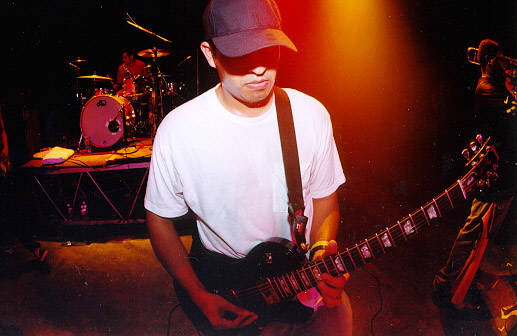
Playing guitar with Attaboy Skip
Here’s one involving Rosati: Attaboy Skip played a couple of those early Extreme Radio fests, the second of which Bad Religion was a headliner on. The afternoon of the show, I snuck Rosati and Kathryn Haines into the backstage area but lost track of them. Rosati was pretty lit and somehow they cornered Brian Baker and talked him into doing that infamous taped interview where Rosati asked Baker if he could have sex with him and if Baker would give him guitar lessons. Needless to say, Baker sounded both horrified and bummed. I wish I could have been there, but now I really wish I could get a hold of that tape. That thing needs to see the light of day.
Tomorrows Gone ended while you were playing and touring with Attaboy Skip, and Attaboy broke up shortly after the demise of TG. Delve into the last days of both bands a bit and share some of your final thoughts on each.
My memory is so bad, I don’t remember opting out of the last tour with TG, which ended up falling through anyway. I read that in your TG retrospective and thought, “Oh yeah! Ugh, I wish I would have found some way to make that happen.” That piece goes into the finer details, but with Jeff sorting out his future between Vegas and the midwest, compounded with the the prospect of replacing Fred, and the revolving door of bass players (Rosati, Billy Schmutz, Pinaud, Kozlowski, etc), it felt like the end of TG was inevitable. In my mind, TG was always yours and Jeff’s band first, and with Jeff far away, it felt strange to try to keep it going without him or only having him around on a limited basis. I feel like I had an important role and I did what I could to contribute to the band in the best ways I knew how, but if either one of you weren’t involved, then it just wasn’t TG. Being a part of the band for those few years off and on, I got to walk away with a lot of great stories and experiences. It was sad to see TG come to an end, and the finality of it set in when you moved to California, but I had a strong feeling I’d eventually try to return to that sound and style of music just because I loved it so much.
With Attaboy Skip, things came back down to earth and as the popularity of that era of ska began its descent, the band slowly started to stagnate. By ’97 we still were playing quite a bit. The core of the group remained virtually intact with few departures. Abe would eventually leave and was replaced by a few different horn players; the ones who stuck the longest included Wes Hines on trombone and Lenny Buttitta (Lenny Booty Titty, according to Ronnie’s brother Dominic) on trumpet. Loren would later leave for dental school and be replaced by returned missionary Branden Campbell, who stuck around until the end.
In that last year, from mid to late ’97 thru ’98, it was feeling like everyone was prepping to move on. We’d been sitting on a handful of songs that I felt were the strongest the band ever wrote, but we never formally recorded them and put them out. There wasn’t any urgency to do so (some of these songs are floating around out there in live form). Rocket From The Crypt was in heavy listening rotation for many of us, which influenced us to write more straight ahead, riff-driven songs, but that wasn’t enough to keep things fresh. Some of us were quietly itching to move on with new music projects, while others began focusing on the rest of their lives (i.e. school, family, careers, etc).
At that time, we were practicing regularly in a small house Ronnie was renting off Rancho and Alta. He and Ted started jamming there with Caleb Lindskoog and Taylor Milne before and after Attaboy Skip practices. Thus Expert On October was born. Right around that same time, I ran into Ryan Butler and we began jamming in the hopes of putting a new melodic hardcore project together. I would later reach out to Rosati and that would go on to become the core of Faded Grey.
By the fall of ’98, Attaboy Skip had totally phased itself out. No more practices or shows and not much external and internal interest. It was an amicable parting, and I’m glad to say that the experience remained fun throughout, even up to the end when the writing was on the wall. For me, the music was secondary – I liked hanging out with those guys and being around them. I’m glad I can still call many of them friends today.
I wrapped up college before that summer so with my professional future unknown but wide open and a new band to work on, I was excited for what was to come.
-Lance Wells
Check out part two of this interview here.

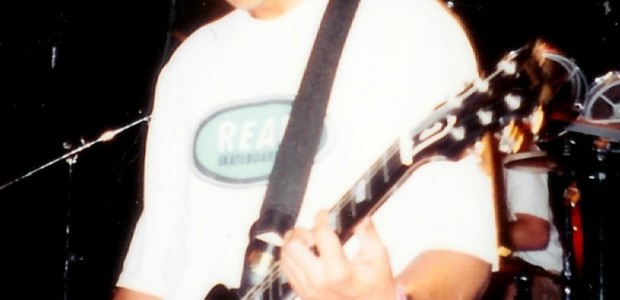



2 Comments